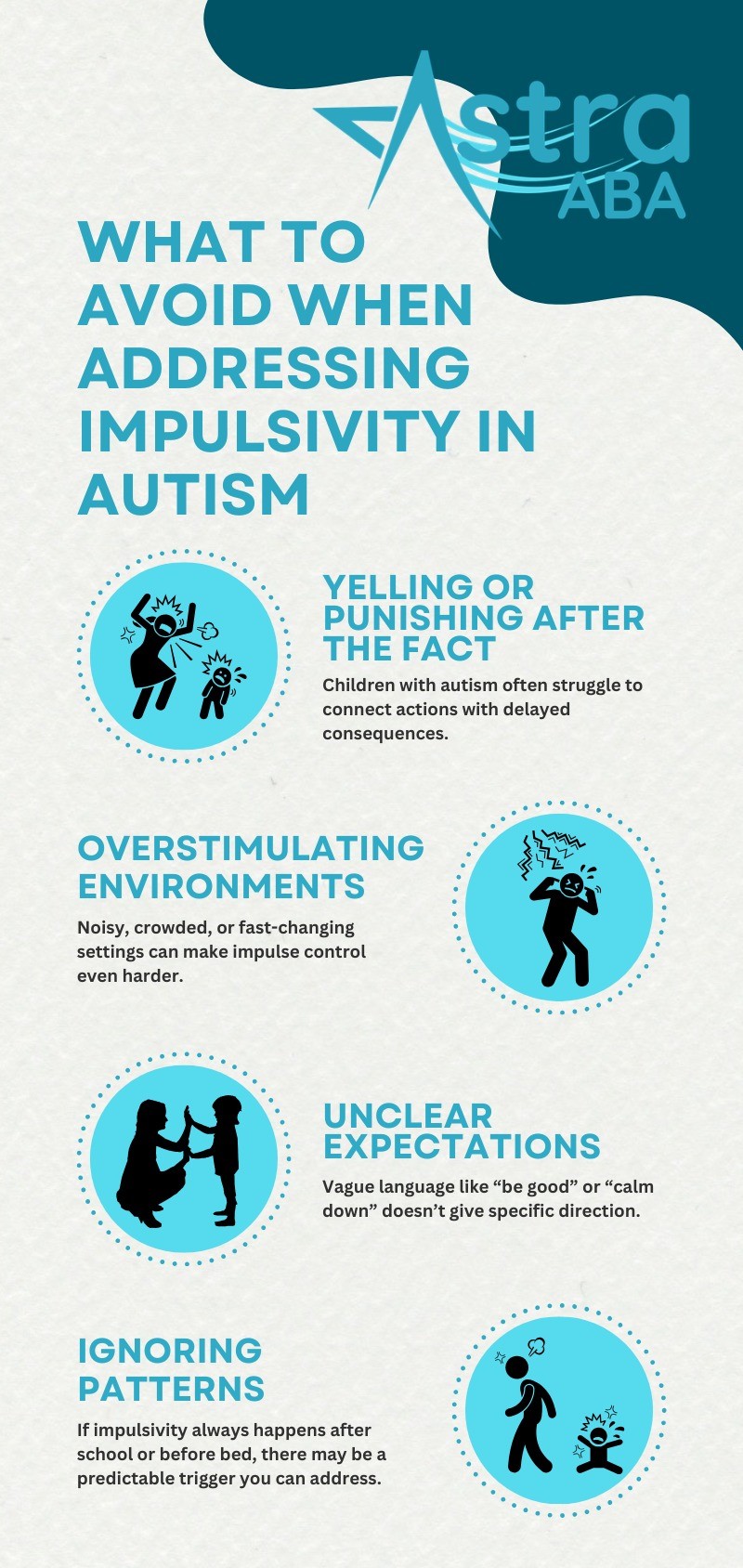Impulse Control in Autism: What Triggers It and How to Help
Learn about impulsivity in autism, including the causes and how impulse control can be managed. Understand the relationship between autism and impulsive behaviors.
July 26, 2025
Key Points:
- Impulsivity in autism is often linked to difficulties with executive functioning and emotional regulation.
- Recognizing patterns behind impulsive behaviors helps caregivers respond with empathy and effective strategies.
- Targeted supports like ABA therapy can teach self-regulation and improve long-term outcomes.
Impulse control challenges are common among children with autism, often leading to sudden outbursts, unsafe behaviors, or difficulty following directions. These behaviors can be confusing or stressful for caregivers, especially when they seem to occur “out of nowhere.”
In reality, they’re closely tied to neurological differences in executive functioning and emotional regulation. According to research, up to 50% of children with autism also exhibit symptoms of impulsivity from ADHD, significantly impacting their ability to manage emotions and behavior in structured settings like school or home.
Understanding what drives impulsivity in autism—and what families can do to support self-regulation—is key to promoting long-term development. In this article, we’ll explore how impulse control works, what it looks like in children with autism, and how parents can respond in ways that are both compassionate and effective.
Does Autism Cause Impulsivity?
Yes, autism can contribute to impulsivity, often due to difficulties with executive functioning, sensory regulation, and emotional control. These challenges may make it harder for children to pause, assess, and respond appropriately in the moment.
Impulsive behavior in autism is not a sign of “bad behavior.” Instead, it reflects developmental delays in the brain systems responsible for filtering actions and managing frustration.
What Does Impulsive Behavior Look Like in Autistic Children?
Impulse control issues in children with autism may present differently depending on the child’s age, communication skills, and sensory sensitivities. Parents may notice specific behaviors that seem sudden, unpredictable, or disconnected from the environment.
Some examples include:
- Interrupting conversations without waiting
- Bolting or running off without warning
- Hitting, grabbing, or pushing others
- Yelling or making loud noises during quiet times
- Difficulty stopping a favorite activity, even when asked
While these actions may appear defiant, they are often unintentional. Children with autism may not have the internal tools to manage impulses effectively without support.
Why is Impulse Control Difficult for Children With Autism?
Impulse control is closely tied to executive functioning, which includes the ability to plan, organize, and regulate behavior. These brain functions are often underdeveloped or differently wired in individuals with autism.
Other contributing factors include:
- Sensory overload: When overstimulated, children may act impulsively to escape discomfort.
- Language delays: Limited verbal skills can lead to physical actions when a child cannot express themselves.
- Emotional regulation struggles: Children may act quickly out of frustration or excitement without considering consequences.
These issues don’t happen in isolation—they often overlap, creating a cycle that’s difficult to interrupt without structured intervention.
How is Impulsivity Different From ADHD?
Impulsivity in autism typically stems from sensory sensitivities, difficulty with transitions, and challenges with emotional regulation, whereas ADHD-related impulsivity is often linked to poor impulse inhibition and hyperactivity. While both conditions may involve acting without thinking, the reasons behind these behaviors differ significantly.
Social understanding also plays a role. Children with ADHD often recognize social expectations but struggle to follow them due to inattention, while autistic children may not fully grasp those expectations to begin with. Communication styles also differ—children with autism might display limited speech or echolalia, while those with ADHD tend to be more talkative. Recognizing these differences is key to building an accurate support plan tailored to each child’s unique needs.
When Should Parents Be Concerned About Impulse Control?
Parents should be concerned when impulsive behaviors pose safety risks, disrupt daily life, or don’t improve with typical guidance. These actions may include running into the street, aggressive outbursts, or an inability to stop and listen. If such behaviors persist or worsen, it may indicate a deeper self-regulation challenge.
In autism, impulsivity is often tied to sensory overload or difficulties with emotional regulation. When impulsive actions start interfering with learning, social connections, or family routines, it’s time to seek professional support. An evaluation can help determine whether therapies like ABA are appropriate for improving impulse control and daily functioning.
Strategies Parents Can Use to Support Impulse Control
While impulsivity can feel overwhelming, there are proactive steps families can take. Many strategies focus on creating structure, reducing triggers, and teaching self-regulation gradually. Before introducing new tools, take time to observe when and why your child tends to act impulsively. This insight can help you choose techniques that are relevant and realistic.
Practical strategies include:
1. Use Visual Schedules
Predictable routines help reduce anxiety and impulsive behavior. Creating visual schedules helps give children a clear picture of what’s coming next, minimizing surprises and supporting smoother transitions throughout the day.
2. Practice Role-Playing and Social Stories
Role-play and social stories let children safely rehearse reactions to common situations. This builds understanding and confidence in responding calmly and appropriately before real-life scenarios occur.
3. Use Short, Clear Instructions
Too many words can overwhelm a child with autism. Simple, direct language helps children quickly understand expectations and respond with less impulsivity or confusion.

4. Reinforce Pauses and Waiting
Teaching children to pause before acting supports self-regulation. Use visual timers, verbal praise, and small rewards to reinforce the value of waiting and thinking ahead.
5. Create Calm-Down Routines
Structured calming strategies—like breathing exercises, sensory toys, or quiet zones—help children regain control and reduce impulsive outbursts during emotionally charged moments.
6. Avoid Power Struggles
Power struggles increase stress and impulsivity. Wait for calm moments to teach or redirect. Focus on connection rather than control when guiding behavior.
Each child is different. What works for one may not work for another—patience and consistency are key.
How Can ABA Therapy Help With Impulse Control?
Applied Behavior Analysis (ABA) is a research-backed therapy that can significantly improve self-regulation and decrease impulsive behaviors in autistic children. ABA focuses on understanding the “why” behind actions and using structured teaching to replace impulsivity with more functional responses.
Here’s how ABA supports impulse control:
1. Data-Driven Behavior Plans
ABA therapists observe patterns to uncover what triggers impulsive behavior. This allows them to create specific, personalized strategies that target root causes and promote long-term self-regulation.
2. Positive Reinforcement Strategies
Children are rewarded for desired behaviors, like waiting or asking for help. This encourages repetition of those behaviors instead of acting out impulsively in challenging situations.
3. Real-Time Skill Building
ABA sessions simulate real-life environments, allowing children to practice impulse control in settings that reflect daily routines at home, school, or the community.
ABA doesn’t just reduce negative behaviors—it actively builds communication, coping, and social interaction skills that empower kids over time.
What Should Parents Avoid When Addressing Impulsivity?
Sometimes, well-meaning strategies backfire or escalate impulsive behaviors. Knowing what to avoid is just as important as knowing what to try. Common pitfalls include:

By understanding the context around behaviors, parents can respond with insight rather than reaction.
Support Your Child's Journey With ABA Therapy
If your child struggles with self-regulation, emotional outbursts, or impulsive behaviors that impact daily life, ABA therapy may offer the targeted support they need. Through consistent routines and individualized plans, ABA can help children with autism build lasting skills that promote safety, confidence, and independence.
Astra ABA offers high-quality, compassionate ABA therapy in North Carolina, Indiana, and Kansas, supporting families with experienced professionals who understand how autism and impulsivity intersect.
Get in touch with us to learn how ABA therapy can support your child’s development and help your family thrive in daily life.
Related Content
Liked this article? Check out these related posts to learn even more!






Ready to start your journey with ASTRA ABA?
Contact us today for a consultation and let us be a part of your child's path to success.
Get In Touch





.png)



.png)



